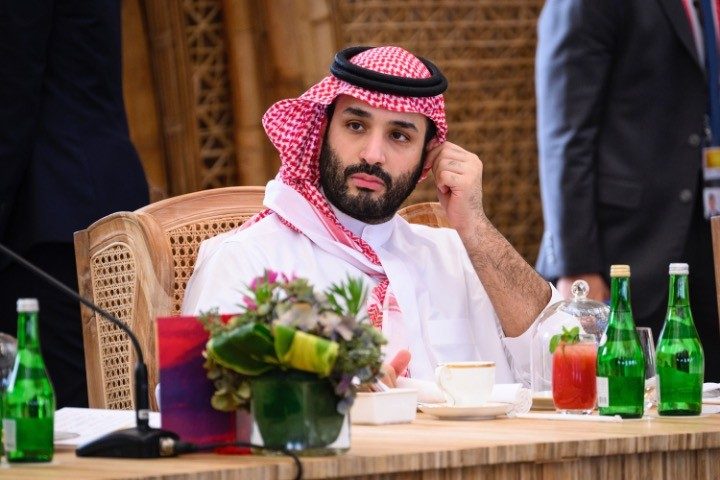
SINGAPORE — On April 3, The Wall Street Journal reported that Saudi Arabia’s Crown Prince Mohammed bin Salman said that he was no longer keen on “pleasing” the United States. Instead, he chose to put U.S. concerns aside and cut oil production, indicating shifting geopolitical trends in the Middle East.
The Saudi prince’s comments came amid announcements made by Saudi Arabia and other members of the Organization of the Petroleum Exporting Countries (OPEC) about oil production cuts amounting to 1.15 million barrels daily, starting May this year and lasting until the end of 2023.
Sources well acquainted with the Saudi prince’s remarks said that the leader wanted “something in return” for any concessions he makes to Washington.
Such an attitude change, analysts have argued, could have major ramifications for long-standing U.S.-Saudi ties. Moreover, as Saudi Arabia is a key Middle Eastern oil producer and regional power, a change in its foreign policy approach toward America could have spillover implications across the region and beyond.
Saudi Arabia’s de facto leader, bin Salman, previously had voiced indifference toward U.S. President Joe Biden. When asked about his thoughts that Biden could have misunderstood him in a 2022 interview by The Atlantic, bin Salman replied: “Simply, I do not care.” He added that isolating the Saudi monarchy would undermine Biden’s position. “It’s up to him to think about the interests of America,” he shrugged, “Go for it.”
In an attempt to undermine Russian influence following the onset of the Russo-Ukraine crisis last February, Biden has tried to court American Gulf allies such as Saudi Arabia, Qatar, and the United Arab Emirates (UAE). During his visit to Saudi Arabia last year, the Democratic president tried to remind Arab leaders of American commitments to the region.
However, Arab leaders did not appear to be too keen to side with Washington. Instead, the Saudi-led OPEC group decided to uphold a previous agreement with Russia to curtail oil production to keep prices up, enabling Russia to keep some purchasing power amid Western-led sanctions in response to the Ukraine conflict.
Although the oil cartel’s decision last November to reduce oil production triggered bipartisan fury in Washington back then, Saudi Arabia maintained that the group’s decision was according to global market forecasts. The Gulf kingdom highlighted that in the wake of China’s lackluster economy, the price of oil at that time — under $80 per barrel — was evidence that the group’s decision did not cause prices to rise.
Mohammed Alyahya, former editor-in-chief at the Saudi-owned Al-Arabiya English website, remarked that Saudi leaders should not be expected to “take decisions that are harmful to the stability of global oil markets in order to take a short-term position, a tactical position for or against one side in the [Ukraine] war.”
Similarly, Elham Fakhro, a Bahraini research fellow at Britain’s University of Exeter, said that Gulf nations did not wish to take sides in rivalries between the United States and other world powers, given their own national priorities. There is no benefit for them in alienating Russia, for example, or forgoing trade benefits with China.
“To several of the Gulf states, this is really about ensuring their survival,” Fakhro opined, alluding to the impetus to maintain close ties with China, the Gulf’s top buyer of oil, and Russia, a key energy and grains exporter.
Indeed, the topic of survival is high on the list of priorities for the Gulf states. In light of waning American influence in the Middle East and a global trend toward de-dollarization among major geopolitical actors such as China, Russia, India, and Brazil to reduce their reliance on the U.S. dollar, Saudi Arabia has sought to heighten security and commercial relations with U.S. rivals such as China.
For instance, in March 2023, the Saudis authorized partial membership in the Shanghai Cooperation Organization (SCO), a political and security alliance that includes China, Russia, and India. This approval came prior to a meeting of foreign ministers from the regional group, where Iran recently became a full member.
The SCO move is part of a wide-range effort in Saudi Arabia and some neighboring Gulf countries to extend diplomatic partnerships beyond traditional Western allies, as uncertainty looms about America’s long-term commitment to guarantee regional security.
In a recent China-brokered agreement, the Saudis rebooted diplomatic ties with rival Iran, entrenching Beijing’s credentials as a regional power broker, and in another move sidelining the Washington, following Russia-mediated talks, the Saudis are working to re-establish relations with Syria. On Friday, April 14, Arab states are expected to hold a meeting in Saudi Arabia to discuss relations with Syria and the topic of Damascus returning to the Arab League. Last month, Saudi Arabia said that it launched discussions with Damascus about resuming consular services.
Historically the SCO has heavily focused on regional security cooperation, and accelerated Saudi interactions with China and Russia risk backlash from the Washington, which is wary of its traditional security partners in the region cozying up to its global rivals. “By engaging with these U.S. rivals, it really does seem like this multipolarity is in full-bore here now,” said Jonathan Fulton, an expert on China-Middle East relations and nonresident senior fellow at the Atlantic Council think tank in Washington. “We’re seeing what a less U.S.-centered Gulf or Middle East looks like.”
Chinese state media reports that Xi Jinping claimed strategic ties with bin Salman were in “the best shape of all time.”
Admittedly, China is Saudi Arabia’s top trading partner. Apart from oil, bilateral business has entailed a massive adoption of Chinese technology and large contracts for Chinese construction companies, as well as military hardware transfers. Additionally, China is aiding the Saudis to generate uranium yellowcake needed for a nuclear-energy program or nuclear-arms capability.
Both countries signed major deals enabling state-owned oil giant Saudi Aramco to have a $3.6 billion stake in China’s Rongsheng Petrochemical Co. Ltd. to increase its downstream presence in China. Such a move also enables Aramco to partner with Norinco Group and Panjin Xincheng Industrial Group to set up an integrated refinery and petrochemical complex in northeast China.
Aramco Chief Executive Amin Nasser said:
We think China will continue to grow in terms of demand. We have a number of investments, but we cannot declare right now, but hopefully in the next one to two years, even through 2023, we are going to have a number of investments in China.
On the other hand, U.S.-Saudi ties have weathered several ups and downs over the years revolving around an oil-for-security agreement in which the Saudis offer the former and the U.S. the latter, and bilateral relations have taken a turn for the worse in recent years.
In particular, because the leftist government of then-U.S. President Barack Obama ditched American backing for longtime ally and former Egyptian President Hosni Mubarak during the 2011 Egyptian revolution, many in the Arab world worry that the U.S. could likewise ditch them.
Plus, the Gulf states felt excluded from American talks with Iran leading up to the 2015 Iran nuclear deal, and to make matters worse, the disorderly nature of the American withdrawal from Afghanistan only entrenched impressions of U.S. disengagement from the Middle East.
Certainly, strained U.S.-Saudi ties do not mean that bilateral relations are completely frayed. After all, bilateral cooperation to contain Iran is still underway amid stalled attempts to revive the nuclear deal. The United States has continued to back the Saudi-led coalition fighting Iran-backed Houthis in Yemen, with the Biden administration approving around $5 billion in military sales to the UAE and Saudi Arabia to boost their air defenses.
Nonetheless, any remaining vestiges of U.S.-Saudi relations do not preclude the Saudis from trying to achieve a wider balance of power in what they apparently view as an ultimately “post-American” Gulf region.



